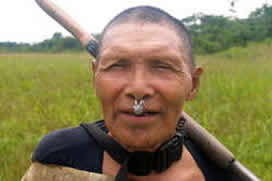Peru: Illegal mahogany threatening remote tribes
19.07.10
Concern for a tribe living in voluntary isolation in Peru is growing as illegal mahogany operations encroach further into their reserve, according to a new report from the Upper Amazon Conservancy (UAC).
 After recent logging success stories (the EU finally banning illegal timber and a global decline in illegal timber) this may dampen the spirits of conservationists and human rights activists.
After recent logging success stories (the EU finally banning illegal timber and a global decline in illegal timber) this may dampen the spirits of conservationists and human rights activists.
Recently-contacted Murunahua man
© Chris Fagan/Upper Amazon Conservancy
The report (available as a pdf) claims that "80 per cent of Peru's mahogany harvest is exported to the USA" and this logging "provides evidence that Peru is failing to uphold the environmental and forestry obligations of its 2009 free trade agreement with the US." The report also claims that officials in the US are "tricked" into believing the mahogany is legally sourced by an intricate system of false documentation and re-processing.
The UAC report, covering the period March 2009 to April 2010, documented logging settlements and felled trees throughout the 481,560 hectare Muranahua Territorial Reserve for Indigenous People in Voluntary Isolation. The Murunahua are just one of a suspected three tribes living an uncontacted existence in the area, which represents possibly the "largest concentration of isolated tribes in Peru and perhaps the world."
Contact with the outside world has proved devastating for these people in the past. Survival International reports that after being contacted by loggers in the mid 1990s an estimated 50 per cent of the isolated tribe died, either as a result of violence or disease.
Related links:
Global: Illegal logging in decade of decline
16.07.10
![]() A new report from the UK-based thinktank Chatham House indicates the battle against illegal logging, a major cause of global deforestation, is being won.
A new report from the UK-based thinktank Chatham House indicates the battle against illegal logging, a major cause of global deforestation, is being won.
India: Sacred mountain still under threat
12.03.10
![]() The sacred mountain at the heart of the Dongria Kondh people's culture remains under threat after a British Government investigation.
The sacred mountain at the heart of the Dongria Kondh people's culture remains under threat after a British Government investigation.
Philippines: Geo-tagging reveals mining threats on the “Last frontier”
01.02.10
 Plant Talk invited Dario Novellino from the Centre for Biocultural Diversity (CBCD), UK to speak out against the logging and mining in protected areas that is destroying the forests of Palawan.
Plant Talk invited Dario Novellino from the Centre for Biocultural Diversity (CBCD), UK to speak out against the logging and mining in protected areas that is destroying the forests of Palawan.
Ecuador: Yasuni - the most biodiverse place on Earth?
22.01.10
A study published in the open access journal Plos One has revealed extraordinary species richness in the western Amazon covering eastern Ecuador and northern Peru.
Peru: One million acres of Amazon saved
01.09.09
 The World Land Trust-US (WLT-US) and their local partner CEDIA (Center for the Development of the Indigenous Amazonians) announced on August 27 2009 that the Matsés National Reserve was approved by the Peruvian government.
The World Land Trust-US (WLT-US) and their local partner CEDIA (Center for the Development of the Indigenous Amazonians) announced on August 27 2009 that the Matsés National Reserve was approved by the Peruvian government.